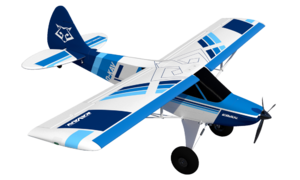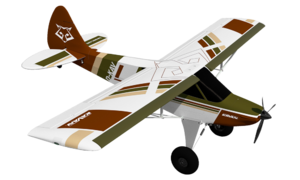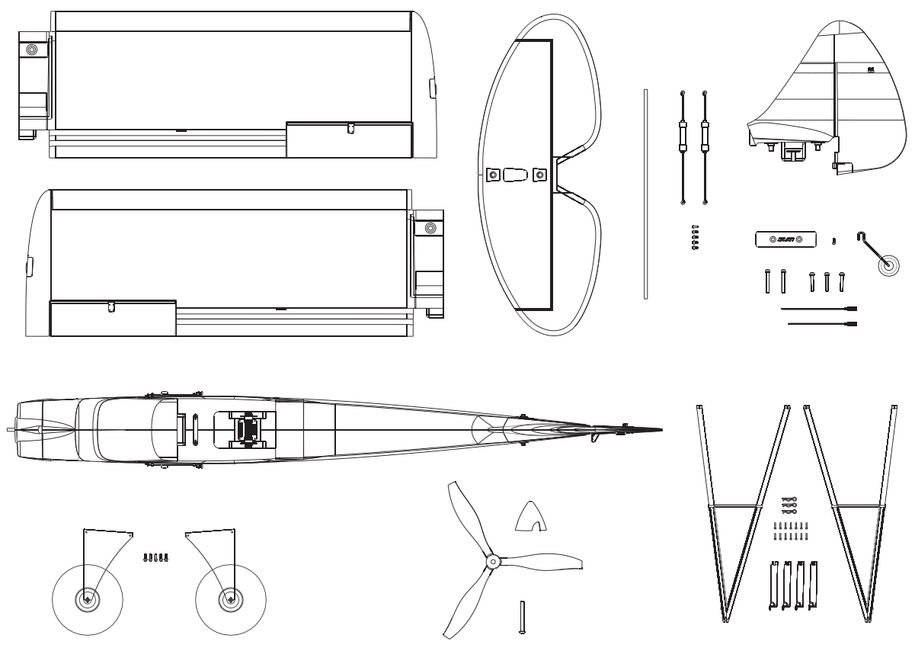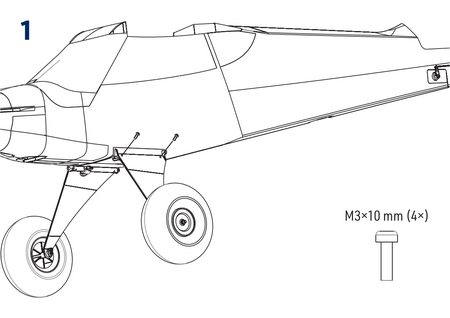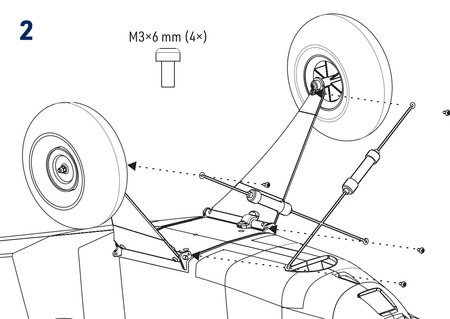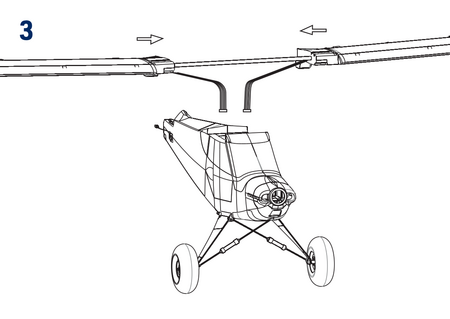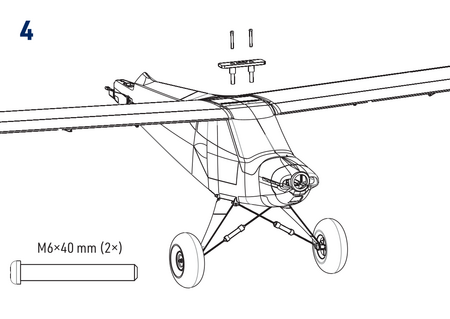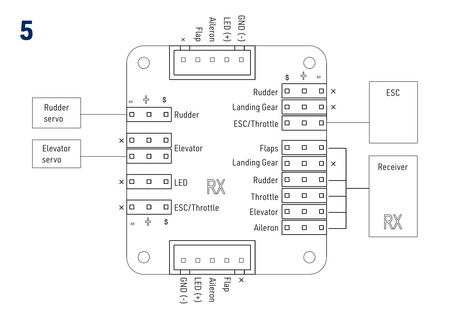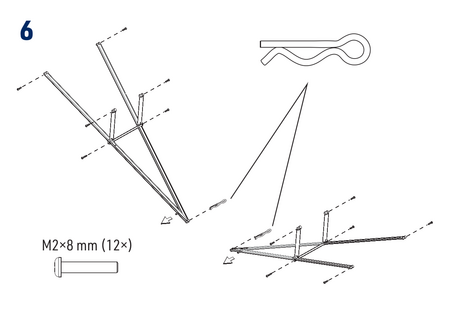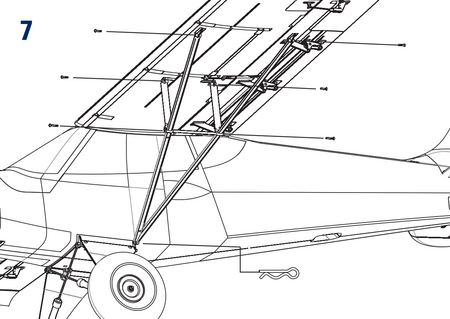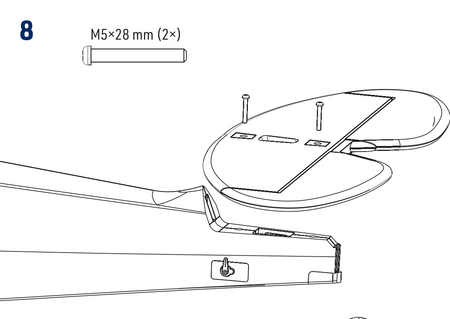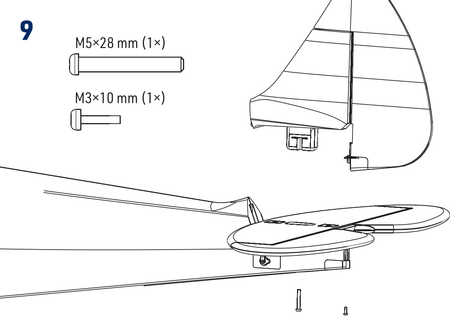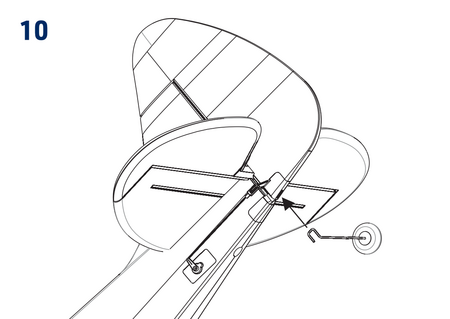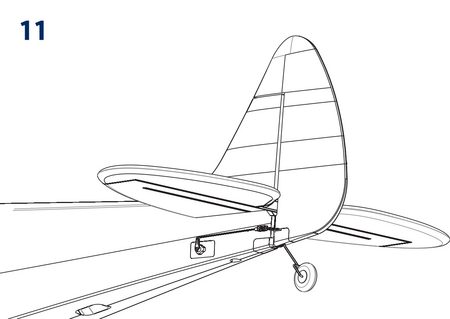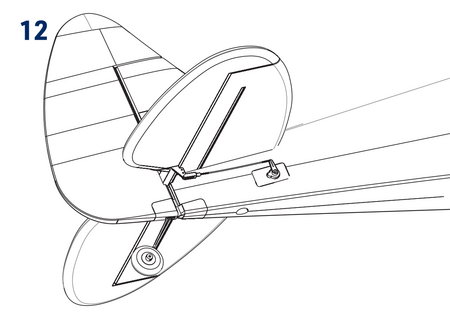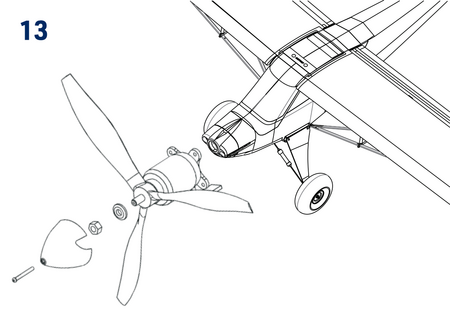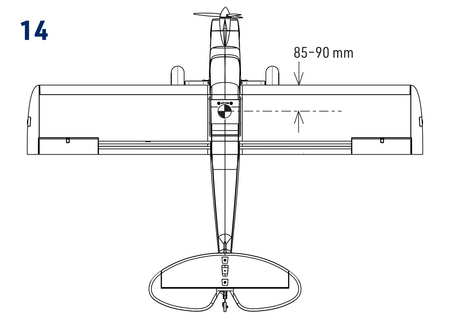KAVAN Norden 1600mm - Instruction manual
Introduction
Congratulations on purchasing the semi-scale model of the Zlin Aviation Savage NORDEN STOL "adventourist" aircraft. You are about to start assembling a model manufactured from virtually unbreakable EPO (expanded polyolefin) foam, powered by a mighty brushless motor and a lightweight LiPo battery. Everybody who has already mastered flying a "full-house" trainer - with aileron, elevator, rudder, and throttle control - will enjoy this beautiful semi-scale model.
Zlin Aviation NORDEN
In the middle of the 1990s, the Italian designer Russo Pasquale and his team set out to create an ultra-light tourist aircraft with excellent flight characteristics, short take-off and landing capabilities, with a classical proven design, which would be economical in operation, and easy to build and maintain. They were inspired by the legendary Piper Cub. But during construction, they used the most modern computer technology and the latest achievements in aerodynamics, top materials and avionics, so they created a perfect machine for the beginning of the 21st century.
The very first type of the Savage line entered production in Italy in 1997/1998; in 1999 the manufacturing was relocated to the Czech Republic. Ever since, it has continued with growing success in the Zlin Aviation s.r.o. company, relying on the long tradition of the world-renowned sport aircraft manufacturer and their highly-skilled work team.
More than 500 pieces of the Savage aircraft have found their customers all over the world so far; the latest addition to the line is the NORDEN, designed for Rotax® 914, 915 or 916 engines of 115/141/160 HP. The manufacturer offers the installation of a wide range of propellers, avionics and custom modifications to fulfil every bush-flyer's dream of an "adventourist" aeroplane capable of landing and taking off anywhere and anytime, providing the unsurpassed enjoyment of flight with a virtually unobstructed view as it was with the legendary Cub.
Specification (NORDEN Standard)
- Wingspan: 9.03 m
- Length: 7.07 m
- Empty weight: 365 kg
- Max. take-off weight (MTOW): 600 kg
- Max. speed: 215 km/h
- Cruise speed: 185–200 km/h
- Stall speed with full flaps and slats: 55 km/h
- Take-off distance (MTOW): <70 m
- Landing distance (MTOW): <80 m
- Engine: Rotax® 914 Turbo 115 HP
For more info about the aircraft visit: www.zlinaero.com/norden/
Before you start
- If you are not an experienced RC pilot, plan to have a fully competent pilot check your completed model and help you with your first flights. Even though we have tried to provide you with a thorough instruction manual, RC models are rather complicated and an experienced modeller can quickly check over your model to make sure your first flights are successful.
- Please assemble your model exactly according to these instructions. Do not attempt to modify or change your model in any way as doing so may adversely change its flying characteristics.
- Before you begin, please check the entire contents of this kit to make sure that no parts are missing or damaged. This will also help you to become familiar with each component of your plane. If you find that any of the parts are either missing or damaged, please contact your dealer immediately for replacement.
- Trial fit each part before glueing it in place. Make sure you are using the correct part and that it fits well before assembling. No amount of glue can make up for a poorly fitting part.
- The manual contains a drawing showing the default position of the Centre of Gravity (CG) and recommended control surface throws. Please note it is essential to keep the recommended CG position for the first flight otherwise the model could be unstable, hard to control or even unable to fly at all! Later you can fine-tune the CG position to suit your flying style and skills.
Safety precautions and warnings
- An RC aeroplane is not a toy! If misused, it can cause serious bodily harm and damage to property. Fly only in a safe place following all instructions and recommendations in this manual. Beware of the propeller! Keep loose items that can get entangled in the propeller away from the spinning propeller, including loose clothing, or other objects such as pencils and screwdrivers. Ensure that your and other people’s hands and faces are kept away from the rotating propeller.
- As the user of this product, you are solely responsible for operating it in a manner that does not endanger yourself and others or result in damage to the product or the property of others. This model is controlled by a radio signal, that is subject to interference from many sources outside your control. This interference can cause momentary loss of control, so it is advisable to always keep a safe distance in all directions around your model, as this margin will help to avoid collisions or injury.
- Never operate your model with low transmitter batteries.
- Always operate your model in an open area away from power lines, cars, traffic, or people. Avoid operating your model in populated areas where injury or damage can occur.
- Carefully follow the directions and warnings for this and any optional support equipment (chargers, rechargeable batteries, etc.) which you use.
- Keep all chemicals, small parts and anything electrical out of the reach of children.
- Moisture causes damage to electronics. Avoid water exposure to all equipment not specifically designed and protected for this purpose.
- The model is mostly made of plastics – it is not fireproof. It may not be exposed to higher temperatures otherwise severe distortion of the foam airframe or other damage may occur.
Specification
| Wingspan | 1600 mm |
| Length | 1275 mm |
| Wing area | 44.3 dm² |
| Weight | 1800 g |
| All–up weight | 2350–2400 g |
| Motor | C3548-750 |
| ESC | KAVAN R-50SB Plus |
| Propeller | 10×6" 3-blade |
Set contents
- Almost ready to fly model with brushless motor, speed controller and servos installed, instruction manual.
You will also need
- At least six channel RC set, 14.8 V 2600–3300 mAh LiPo flight pack.
- Regular modeller's tools: precision knife (KAV66.770), screwdrivers, pliers, No. 10 spanner, 1.5 mm and 2.5 mm hex keys or screwdrivers, sandpaper etc.
Model assembly
- Secure the undercarriage legs using four M3×10 mm hex bolts to the fuselage. (Fig. 1)
- Secure the undercarriage spring struts using four M3×6 mm hex bolts to the fuselage and undercarriage legs. (Fig. 2)
- Slide the wing halves onto the wing tube joiner. (Fig. 3)
- Secure the wing using a plastic joiner and two M6×40 mm nylon bolts to the fuselage. (Fig. 4)
- Put together the wing struts and secure them to the fuselage and wing using M2×8 mm hex bolts and steel clips. (Fig. 6+7)
- Hook up your receiver, servos and ESC following the wiring diagram (Fig. 5). The receiver is to be secured with a strip of double-sided foam tape or hook-and-loop tape to the rear part of the cockpit. Deploy the antennas so their active parts are square to each other (if you are using a receiver featuring diversity antennas). Note: The kit is supplied with the connection board for ailerons, flaps, elevator, rudder, ESC and LED lights so you can use even the most basic 6-channel radios to control your NORDEN. If you intend to use independent control of aileron and flap servos and an advanced computer radio, you will have to bypass the connection board accordingly with a pair of wing reduction cables (e.g. KAV02.8091.9). The LED lights are only powered via the connection board; they are not remote-controlled in any way.
- Secure the horizontal tailplane using two M5×28 mm nylon bolts to the fuselage. (Fig. 8)
- Secure the fin using one M5×28 mm nylon bolt and one M3×10 mm hex screw to the fuselage. (Fig. 9)
- Slide the tail wheel assembly into the receptacle at the bottom of the rudder. (Fig. 10)
- Install the rudder and elevator linkage. (Fig. 11+12)
- Attach the propeller to the prop driver and secure it with the propeller nut with a washer; tighten the nut using a No. 10 spanner. (For your safety, you should better leave the propeller installation after your radio is all connected and set and the correct direction of rotation of your motor has been tested.) Secure the spinner using an M2.5×20 mm bolt in place. (Fig. 13)
- Open the battery compartment hatch and put your flight pack inside. With your radio on, set the servos to the neutral position (sticks and trims centred) and fasten the setting screws of the pushrod connectors on the elevator and rudder servo arms. Perform the throttle range calibration of the ESC as described in the attachment of this manual.
The ARF kit contents:
RC set installation and preflight check
- Referring to the instruction manual of your radio carefully hook up the onboard electronics.
- Once everything has been correctly connected, turn on your transmitter and plug in the flight pack. Check the neutral positions and throws of all control surfaces. If you need to make the control surface throws smaller, simply move the pushrod closer to the centre on the servo arm or move it far from the control surface on the control horn. And vice versa.
| Recommended throws | *Low rate | High rate | ||
|---|---|---|---|---|
| Rate | Expo | Rate | Expo | |
| Ailerons | ± 13 mm | 30 % | ± 20 mm | 30 % |
| Elevator | ± 14 mm | 30 % | ± 20 mm | 30 % |
| Rudder | ± 35 mm | 20 % | ± 45 mm | 20 % |
| Flaps | Take-off: -12 mm down / Landing: -28 mm down | |||
*) The "Low Rate" recommended control surface throws are suitable for a less skilled pilot and regular "scalish" flying; the "High Rate" setting allows an experienced pilot to explore the full capabilities of his model.
- Especially less experienced pilots might find their NORDEN easier to fly with some extra mixes on (mix rates for the high rate throws):
Aileron → Rudder: 15 mm left rudder at full left ailerons, 15 mm right rudder at full right ailerons
Aileron differential: 20 mm up aileron/10 mm down aileron
Flap → Elevator: 2 mm down elevator for take-off flaps, 0 mm elevator for landing flaps setting.
- Check the direction of rotation of the propeller. If it was incorrect, simply swap two of the three wires between the ESC and motor.
- Check the correct position of the centre of gravity (CG): 85–90 mm behind the leading edge of the wing (Fig. 14). Adjust the CG position by moving the flight pack - if you can't reach the recommended position, do not hesitate to add an appropriate amount of lead to the nose or tail. An extra couple of grams won’t spoil the flying characteristics - but the incorrect CG position is a killer.
- Fully charge your flight pack and transmitter batteries, check the proper function of your radio and perform the range check of your radio according to its instruction manual. The range has to be almost the same with the motor off and at full throttle (no more than a 10% decrease is acceptable). DO NOT try to fly unless the range check is 100% successful.
Flying
The test flying and fine-tuning is pretty much straightforward, there will be no surprise for a medium-advanced pilot that is supposed to fly this model.
Appendix
KAVAN R-50SB Plus instructions
Please refer to the KAVAN Plus ESCs - Instruction manual.
Recycling and Waste Disposal Note (European Union)

Electrical equipment marked with the crossed-out waste bin symbol must not be discarded in the domestic waste; it should be disposed of via the appropriate specialised disposal system. In the countries of the EU (European Union) electrical devices must not be discarded via the normal domestic waste system (WEEE - Waste of Electrical and Electronic Equipment, Directive 2012/19/EU). You can take your unwanted equipment to your nearest public collection point or recycling centre, where it will be disposed of in the proper manner at no charge to you. By disposing of your old equipment in a responsible manner you make an important contribution to the safeguarding of the environment!
EU Declaration of Conformity (European Union)

Hereby, KAVAN Europe s.r.o. declares that the Norden 1600 model and the included electronic and electric devices are in compliance with the requirements of relevant European directives and harmonized norms. The full text of the Declaration of Conformity is available at www.kavanrc.com/doc/.
Guarantee
The KAVAN Europe s.r.o. products are covered by a guarantee that fulfils the currently valid legal requirements in your country. If you wish to make a claim under guarantee, please contact the retailer from whom you first purchased the equipment. The guarantee does not cover faults which were caused in the following ways: crashes, improper use, incorrect connection, reversed polarity, maintenance work carried out late, incorrectly or not at all, or by unauthorised personnel, use of other than genuine KAVAN Europe s.r.o. accessories, modifications or repairs which were not carried out by KAVAN Europe s.r.o. or an authorised KAVAN Europe s.r.o., accidental or deliberate damage, defects caused by normal wear and tear, operation outside the Specification, or in conjunction with equipment made by other manufacturers. Please be sure to read the appropriate information sheets in the product documentation.
